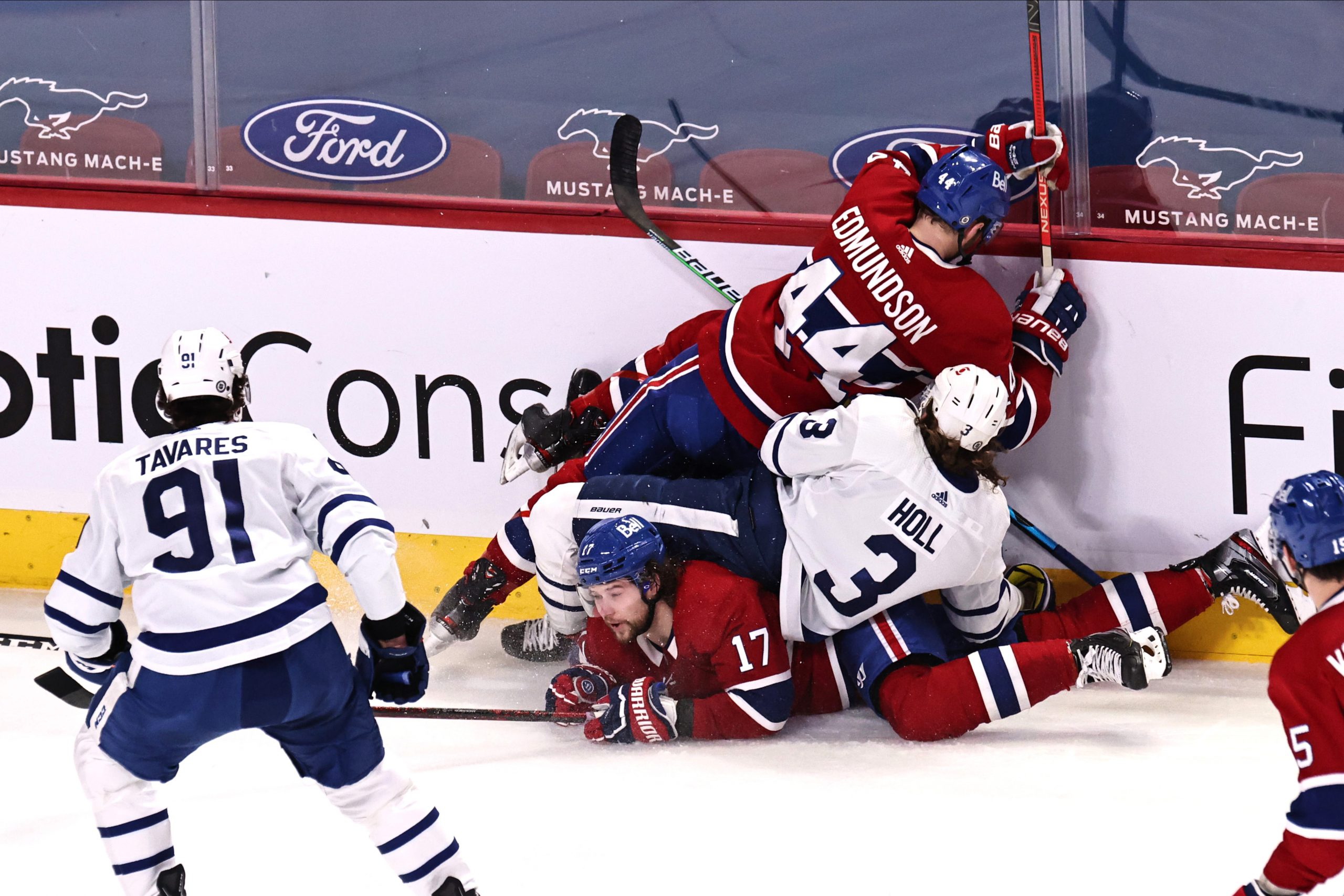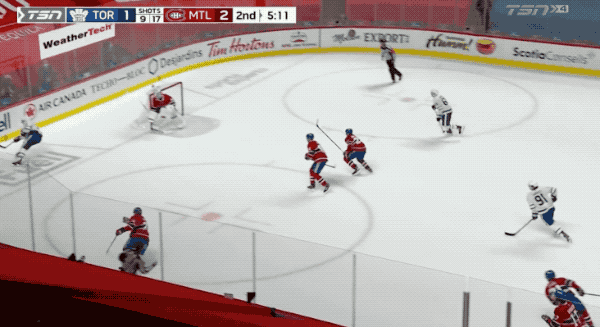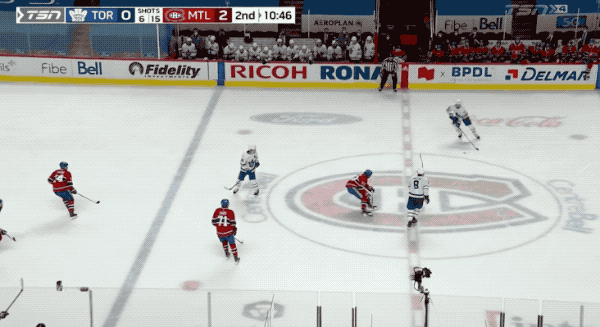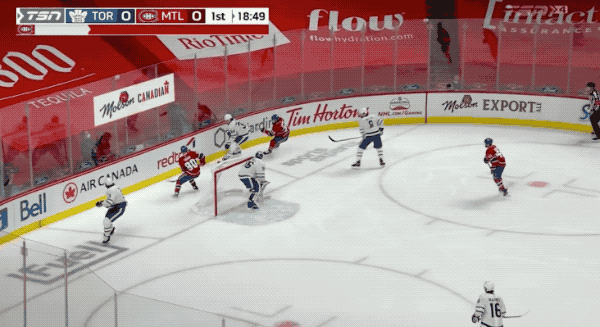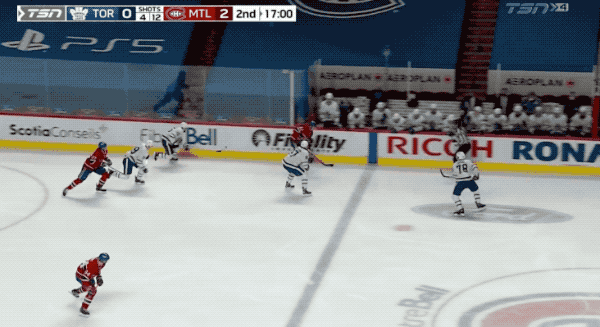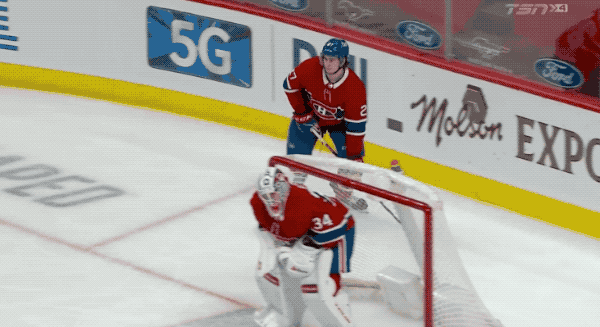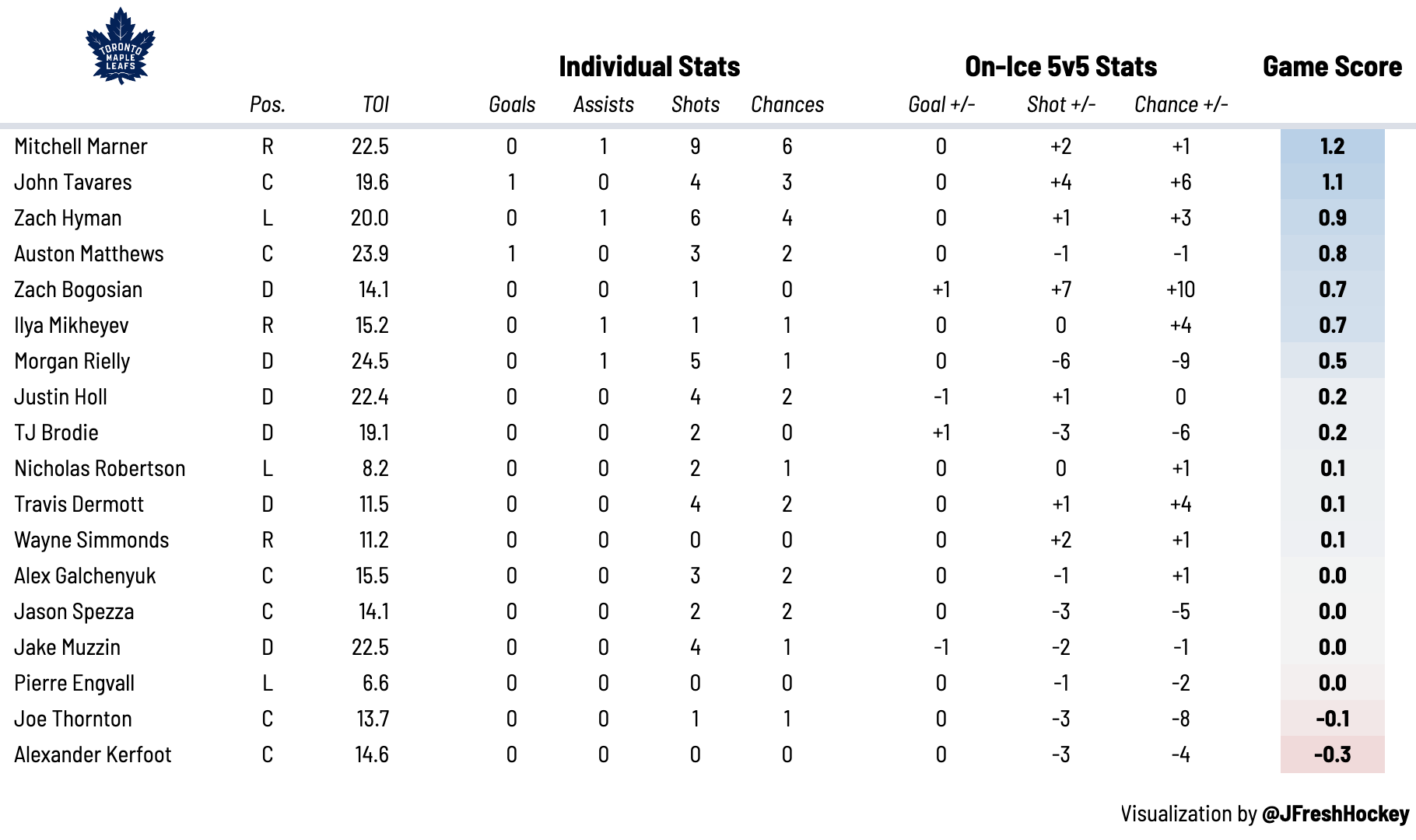Well, I hope everyone enjoyed The Masters this weekend.
The Maple Leafs certainly looked like they did. Monday night was one of their worst performances of the season. They lost the game 4-2 to Montreal, but for anyone who was watching the game live, you never got the sense that Toronto deserved to be in it.
Tonight was obviously a bit of a letdown after the last 24 hours of mayhem, with the Leafs ponying up assets to acquire Nick Foligno, David Rittich, and Ben Hutton at the deadline. It’ll be interesting to see how all of these names fit into the lineup, but we’ll make those assessments at a later date.
You know why you’re here; it’s time to hand out some report cards!
3 Stars
Game Puck: John Tavares (C, #91) — I’ve been doing these post-game report cards for a few years now. I can’t remember the last time I had Toronto’s top-ranked player with only three out of five stars. It was that kind of game for the Leafs.
The good news is that Tavares did a great job winning pucks back in the offensive zone. At one point, he intercepted a pass and then fed Zach Hyman with a backdoor pass, only for the puck to bounce over his stick.
Later on, Tavares found himself in a high-danger area with a loose puck nearby.
He’s so good at finishing from tight spaces.
It’s hard to believe how rarely Tavares has been able to convert on these types of chances this year, but maybe tonight is a sign of his luck turning around. Based on his shot locations in 2021, Moneypuck.com figures he should have six more goals than he actually does this season, which would put him on pace for 37 across an 82-game season.
That sounds about right to me.
Zach Hyman (RW, #11) — In the clip above, you’ll notice it’s Hyman who creates the rebound by forcing his way into the blue paint. Those are the kind of gritty assists we’re used to seeing Hyman pick up.
In addition to that power forward playstyle, Hyman has also been carrying the puck up the ice with possession lately, which has been nice to see. Instead of chip-and-chasing pucks into the corner every time, he’s been able to diversify his approach to creating offense, which has made him much more difficult to defend this season.
The Matthews-Marner Combo — This was far from their most dominant game. Much like the rest of their teammates, neither player was able to break through Montreal’s neutral zone trap with consistency. I liked Mitch Marner‘s play without the puck, but we’re used to seeing him be more dynamic with it in transition.
The tough part about evaluating these two is that they can each have an off-night, and it still only takes one mistake for them to find the back of the net.
I decided to show the full play here so you could see things develop. TJ Brodie makes a nice play to win the puck back on the forecheck before Matthews recycles possession back up top to Rielly, who finds Marner in the middle of the ice.
The next pass is the reason you pay so much for star talent. Those are the type of game-breaking plays you need to score goals against well-structured teams.
Alex Kerfoot (C, #15) — I actually liked his game tonight. Usually, I give Kerfoot a hard time for the things he doesn’t do (i.e. making a play after gaining the zone). Tonight, I noticed a lot of little things he was doing to impact play in a positive way, particularly without the puck.
Kerfoot was really good at backtracking fast through the neutral zone, breaking up rushes, winning pucks back, and settling things down to start Toronto’s breakout the other way. He also drew a tripping penalty in the third period by doing what he does best; carrying the puck through the neutral zone with speed.
TJ Brodie (RD, #78) — This one shouldn’t take too long. Despite playing alongside an “erratic” partner, which might be putting it nicely tonight, Brodie did a great job of settling things down defensively by taking away the middle of the ice. There were a few breakdowns for Toronto’s top pair tonight, but as we’ll discuss later, I don’t think many of those were Brodie’s fault. He made good reads in the neutral zone, gapped up when he needed to, and even completed a few slick “slip passes” to get his forwards in open ice the other way.
The Muzzin-Holl Pair — They had a few memorable shifts where they looked noticeably out of gas, resulting in a few too many quality chances against. Despite those rough moments, the Leafs still managed to break even when Justin Holl was on the ice, which speaks to the subtlety of his game.
The next time you’re watching the Leafs, try to focus on Holl when he’s defending the rush. It’s never “pretty”, but he gets himself to the right spots and makes life difficult on the opposing forward, getting his stick in their airspace when they’re trying to make a move. Jake Muzzin is also fantastic at this, killing plays well before they become dangerous.
Now, he did almost get burned by Paul Byron, but so does every NHL defenseman. When you focus on the little plays Muzzin makes throughout the course of the game (e.g. holding the line in the OZ, stopping the cycle in the DZ, mucking things up in the NZ), you start to realize why he’s such an effective player at 5v5.
2 Stars
The Bottom Pairing — In the latest edition of analytics vs. the eye-test, I didn’t love Zach Bogosian‘s game tonight, but he led the team in 5v5 shot differential and scoring chance differential. I’d imagine that a lot of that is thanks to some of his breakout passes up the ice, including a few successful stretch passes.
The other element to keep in mind here is Travis Dermott, who’s always done a good job of settling down loose pucks and starting Toronto’s breakout in sheltered minutes. I’d still like to see Dermott look to make a pass after stepping over center ice instead of dumping it every time. He’s leaving chances on the table when he gives the other team the puck instead of trying to complete the next play.
One final note before we end this section: neither of Bogosian’s minors tonight were “intimidation” penalties. He unnecessarily high-sticked a Montreal forward in front on the first call, then touched a puck before Rielly came off the ice for a too many men penalty. I know Bogosian is a “physical presence” on the bottom pairing, but most of his penalties this season have simply been the result of poor discipline.
Alex Galchenyuk (LW, #12) — The bounces aren’t always going to go your way.
Sometimes this sport can be cruel. Aside from that blunder, Galchenyuk did an okay job of making plays up the ice, although we’ve definitely seen him make a bigger impact both with and without the puck.
Jason Spezza (RW, #19) — I found it crazy that he had zero shot attempts after 50 minutes of play. Spezza ended up getting a few more chances later on, but we’ve come to expect more from the Leafs’ leader in 5v5 (and 5v4) Points per 60.
Ilya Mikheyev (LW, #65) — Yes, that was a bad defensive zone turnover by Ilya Mikheyev to blindly throw a backhand pass into the middle of the ice. Then again, if Zach Bogosian doesn’t take an undisciplined high-sticking penalty shortly afterward and the Leafs don’t allow the ensuing power-play goal, is it really a play we’d remember?
Maybe, but I think we tend to overstate the importance of “big mistakes” when there are so many other plays to evaluate in a 60-minute hockey game. This is to say, I quite enjoyed Mikheyev’s 200-foot performance aside from his blunder.
He was disruptive on the forecheck and backcheck, as always. More importantly, he was able to complete some passes after crossing the blue line, which is a big step for him offensively.
1 Star
Jack Campbell (G, #36) — He didn’t play well in this game. Frankly, very few Leafs did tonight, which is why the following quote is a big deal to me.
Jack Campbell: "I'm embarrassed by my effort to be honest. I cost us the game."
— James Mirtle (@mirtle) April 13, 2021
I know Jack Campbell is his own harshest critic, but this almost comes across as disingenuous. The first goal he allowed was a complete fluke off of Galchenyuk’s skate. The second one was a save-able shot from Nick Suzuki on the power play, although he was partially screened by Morgan Rielly. The third goal is where he’s probably kicking himself, getting beat short-side by Josh Anderson on a 2-on-1.
That said, Campbell also made a few huge saves in the third period to keep the Leafs in the game when they had no business competing for two points tonight. I love it when people genuinely apologize for things that are their fault, but this was the equivalent of Kyle Dubas holding himself accountable for the Leafs’ poor penalty kill under DJ Smith.
You don’t need to apologize — it wasn’t your fault.
Coaching Staff — Yikes. Where do we even begin here? Toronto is now 1 for its last 36 on the power play, while allowing three shorthanded goals in that span. The solution: Joe Thornton and Wayne Simmonds on PP1.
Shockingly, that didn’t work.
We’ve reached the point where this isn’t just bad luck. The Leafs are struggling to gain the zone and set up on the power play, which isn’t aided by the fact that pucks keep dying on Thornton and Simmonds’ sticks. Only time will tell if Sheldon Keefe has the courage to do what Mike Babcock couldn’t; healthy scratch the San Jose legend who is no longer one of your 12 best forwards.
One thing I will give Keefe credit for tonight is owning it.
Sheldon Keefe: "That one falls upon me."
Everyone's taking the blame tonight…
— James Mirtle (@mirtle) April 13, 2021
That’s not an easy thing to say. In an industry where everyone preaches “accountability”, you’d be surprised how rarely the 200 hockey men practice what they preach. Unlike with Campbell, I actually think Keefe is right to own it here.
Morgan Rielly (LD, #44) — Evaluating these players for the last couple of years has given me a chance to look for little nuances in their game. With Rielly, the one aspect I keep coming back to is his gap control when he’s defending the rush.
When he’s in a situation where he has to defend a 1v1 rush, the opposing player is able to gain the zone and get their shot off far too easily. Here’s a quick example from tonight.
This is one isolated incident, but it happens a lot for a guy who’s trusted to play as many minutes as Rielly does against the NHL’s best forwards. Instead of gapping up and killing the play early, Rielly gives Corey Perry a few stick-lengths of room when he crosses the blue line, which allows him to walk in and shoot from a quality location.
Another area where Rielly can be infuriating is the way he reads odd-man rush situations. There was one play earlier in the game where Brodie stepped up in the left side of the neutral zone. Instead of sliding over to the right side to cover the open ice, Rielly stayed behind Brodie, which allowed Paul Byron to break in on alone on Campbell.
Rielly also misplayed the following 2-on-1.
That 3rd goal, Rielly was really committed to playing Anderson like it was a clear 2-on-1. Seemed readable that 65 was gonna be back to offer help tho, maybe just a lack of communication. Either way too good a spot to give up a minimally challenged shot from when you’ve got help. pic.twitter.com/TjcSJ895i5
— Justin Bourne (@jtbourne) April 13, 2021
And the 2-on-1 after that.
I love it when Rielly is roaming around the offensive zone looking for high-danger passes, but we need to acknowledge when he gives most of that value back the other way. His 5v5 defense has been a problem his entire career, and frankly, I don’t think it’s improved much.
Benched — For anyone trying to read the tea leaves with respect to who comes out of the lineup next week when William Nylander and Nick Foligno join the fold, I think Pierre Engvall‘s one shift in the second period speaks volumes.
I can understand Keefe’s frustration; Engvall had tunnel vision tonight when he was carrying the puck, failing to find his open linemates in transition. The fact that he delivered a hit in his first shift back in the third period suggests to me that Keefe wants Engvall to use his size more often to win pucks back. At 6’5 and 214lbs, I’d agree with him there.
It’s also worth noting that Nick Robertson only played three shifts in the second period. He made a few high-skill plays with the puck to get himself out of trouble in the DZ and NZ when he was skating up the ice, but he seemed to be turning pucks over far too often along the boards.
I love Robertson’s upside; his puck-skills and shot are NHL-ready today, but if he’s going to play big minutes at 5v5, he needs to add some more strength so he isn’t getting pushed around as often. The good news is that he isn’t afraid; he took a (successful) run at Shea Weber in the corner, winning the puck back on the forecheck.
Probably should be benched — As we just mentioned, two forwards will be joining the Leafs next week, which means two will need to come out of the lineup. Based on the recent play of Joe Thornton and Wayne Simmonds, I’m finding it difficult to justify anyone else taking a seat.
Thornton was awful tonight, failing to connect on his east-west passes, especially on the breakout. He continues to provide zero value as the bumper on Toronto’s power play, which isn’t entirely his fault to be fair; his coaches shouldn’t be playing him there on PP1.
The issue is that pucks keep dying on his stick, which has been the case for Simmonds all season at 5v5 if we’re being honest with ourselves. I like him as a net-front presence, but the Leafs have so much difficulty getting to the offensive zone when Simmonds is on the ice (even at 5v4) that it almost defeats the purpose of having him there.
Heat Map
Here’s a quick look at where each team’s shots were coming from at even strength, courtesy of Natural Stat Trick.
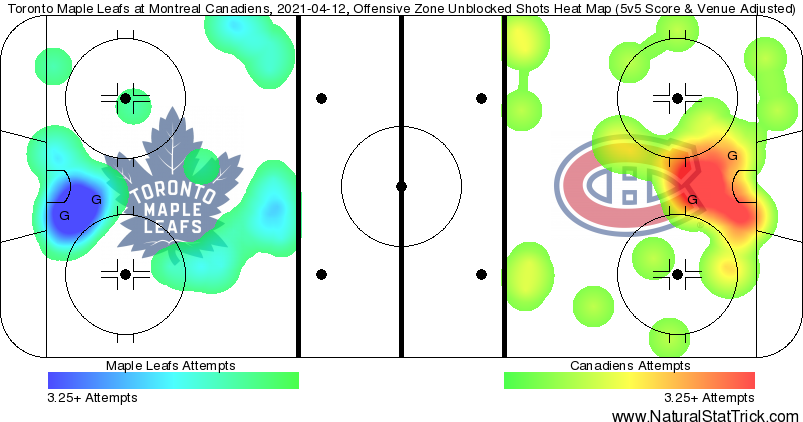 I was pretty surprised to learn that Toronto only got slightly outshot (46%) and out-chanced (48%) at 5v5. I’d be curious to see if the expected goals looked different after accounting for odd-man rushes and east-west passes.
I was pretty surprised to learn that Toronto only got slightly outshot (46%) and out-chanced (48%) at 5v5. I’d be curious to see if the expected goals looked different after accounting for odd-man rushes and east-west passes.
Watching the game while taking rigorous notes, this certainly didn’t feel like a close game.
Game Score
Game score is a metric developed by The Athletic’s Dom Luszczyszyn to measure single-game performance. You can read more about it here.
Tweets of the Night
Tonight was one of the more unbearable viewing experiences of the season, so let’s take a look at some tweets from the 24 hours before the game.
It is legitimately insane that the Sabres retained 50% on Hall and all they got was Bjork and a second. I don't even know if she plays hockey
— Acting the Fulemin (@ATFulemin) April 12, 2021
She’s from Iceland, so now I’m picturing her on Wolf Stansson’s squad in Mighty Ducks D2.
I WAS KIDDING https://t.co/3KyAdfs00M
— Scott Matla (@scottmatla) April 12, 2021
At the end of our Nick Foligno emergency podcast, I joked that Taylor Hall would get traded to Boston for a second-round pick. Be careful what you wish for, kids.
my contribution to the ben hutton conversation is this pic.twitter.com/DVFJ4isQTp
— rahef 🌷✨ (@rahef_issa) April 12, 2021
As the conductor of the Travis Dermott bandwagon, this is conflicting. I think I’m a Ben Hutton fan now.























